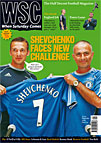 Pete Green finds that although everyone wants to see their club on TV it's affecting attendances lower down the pyramid
Pete Green finds that although everyone wants to see their club on TV it's affecting attendances lower down the pyramid
Supporting a smaller club has always had its consolations. You might not be able to understand a word spoken over your ground’s superannuated PA, but you don’t need to cash in your pension plan for a season ticket and are largely unaffected by TV rearranging kick-offs. But even the humble comforts of a steady Saturday routine can no longer be relied upon at several lower-division clubs, as an increasing number of games are being moved to Friday nights. Chester have rearranged seven of this season’s matches in this way and Tranmere eight. Chuck in two or three Tuesday games and winter postponements, and less than half your home programme could be on Saturdays.
Why? Money, as always, is the short answer. “We are being encouraged by the Football League to increase crowds,” explained Darlington’s chief executive Jon Sotnick (the clubs themselves presumably never having entertained the idea of attracting new supporters), “and there is evidence that the turnout across the league has been greater on a Friday night than on a Saturday afternoon.”
True, some clubs have a tradition of playing on Fridays and most supporters at this level acknowledge that their clubs could try a few tricks to boost the gates. Many existing fans, though, feel their interests are being ignored in the dash to attract newcomers. A preference for Saturday afternoon kick-offs is generally the stuff of basic practicality, not stubbornness, as night matches are largely inaccessible to both away supporters and “exiled” home fans without booking time off work.
Not surprisingly, fans have reacted with anger to the changes. Chester’s Stephen Vaughan – one of that breed of chairmen who seem permanently exasperated about everything – has denounced “season-ticket holders demanding to be reimbursed because they don’t like all the games being switched to a Friday night”. A number of Darlington fans, similarly, have declined to renew their season tickets. Others had already bought theirs when the rescheduling was announced – including some who had shelled out on advance train tickets, which are now useless and non-refundable – leaving the cancellation of their kit sponsorships as the only way of protesting.
Indeed, Sotnick’s breezy dismissal of these concerns made no distinction between loyal and casual supporters. “There are some fans that will not be able to attend for one reason or another, but the same can be said for games on a Saturday afternoon or any other day of the week,” he said.
“It’s swings and roundabouts,” Darlo fan Steve Duffy admits, “but some of us feel like we’re being locked out of the fairground.”
Supporters of my club, Grimsby Town, have also been alienated by shoddy communications as well as misleading claims about the success of the experiments. Last summer Town claimed that a Friday kick-off against Oxford had “proved to be a winner”, but the attendance was below that season’s average. Fans emailed complaints to the address given in the club’s online “customer charter”; none received a reply. Friday night crowds at Grimsby have been artificially inflated by free tickets for children and priority vouchers for forthcoming cup ties and when neither were available at last November’s Friday nighter against Macclesfield the gate plunged to 3,658 – Blundell Park’s lowest in the league all season.
A nadir was reached on July 4 this year, when the Grimsby Telegraph briefly mentioned that the home game against Mansfield in August would be switched to a Friday night to avoid a clash with a “family fun day” at Cleethorpes Boating Lake. Extraordinarily, this is still the only notification Town fans have received. Mansfield have announced the rearrangement, but at the time of writing Grimsby are yet to publicise it on their official website.
Where might all this be leading? Duffy fears for the future of weekend football: “If similar experiments are replicated at other clubs, we could be heading into the realms of a ‘floodlit’ Friday league.”
From WSC 235 September 2006. What was happening this month